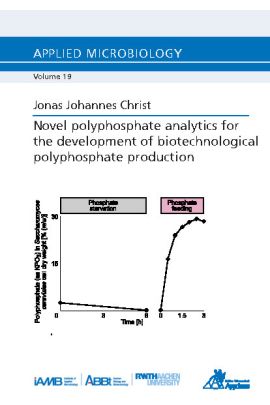Phosphate (Pi) is an irreplaceable nutrient in the human diet and is mined from Pi rock. Strategies for the recycling of Pi from unused Pi waste streams must be developed because the global Pi rock reserves will be depleted in a few hundred years. Canola meal (Pi bound as phytic acid) is generated as a side product during the deoiling of canola seed (Brassica napus). Four project partners developed the process ValuePP to recycle Pi from canola meal into inorganic polyphosphate (polyP). PolyP is the linear polymer of Pi with a chain length n of 2 to ca. 1,000 P-subunits, is currently only produced chemically, and is used in food products. The ValuePP process began with a phytase treatment to release Pi from canola meal. Pi was accumulated and intracellularly polymerized into polyP by Saccharomyces cerevisiae. PolyP-rich S. cerevisiae served as the substrate to produce polyP-rich yeast extract or pure biotechnologically synthesized (bio-)polyP. The overall goal of this Ph.D. thesis was to develop the latter three processes and methods for the analysis of polyP. An analytical polyP extraction was developed that extracts 40 % more polyP than the best literature method (5 h, five reaction tubes), takes 30 min, and requires one reaction tube. A colorimetric Pi assay was developed, which involved the addition of 1 reagent to the sample and took 2 min for color development (literature: 2 reagents, 30 min). An enzymatic total polyP assay was developed that fully quantified polyP (literature: exclusion of polyP2). Recently, the average polyP chain length could only be detected quantitatively by 31P nuclear magnetic resonance spectroscopy. Here, an enzyme assay was developed for the quantification of this parameter. A cultivation strategy was designed to produce wild type S. cerevisiae with the so-far highest reported polyP content (28 % polyP as KPO3 in cell dry weight). Processes for the fabrication of the novel products polyP-rich yeast extract and pure water-soluble food-grade bio-polyP were developed. Both products can be used as food additives. Together with the project partners, Pi was, for the first time, recycled from canola meal into polyP-rich yeast extract and pure bio-polyP. Phytate-reduced canola meal can be used in Pi-controlled livestock feeding. The German (2,700 t) and European (11,000 t) demand for polyPn ≥ 4 could be satisfied if one-third of the annually in Germany produced canola meal (2 * 106 t) would be subjected to the ValuePP process.
| Autor | Christ, Jonas |
|---|---|
| Lieferzeit | 3-4 Tage |
| Gewicht | 0.366 kg |
| Erscheinungsdatum | 15.04.2020 |
Institut für Angewandte Mikrobiologie (iAMB)
Novel polyphosphate analytics for the development of biotechnological polyphosphate production
Kurzbeschreibung
Phosphate (Pi) must be recycled due to the limited nature of fossil Pi rock. Inorganic polyphosphate (polyP) analytics were established in this Ph.D. thesis. The biotechnological production of the novel products polyP-rich yeast extract and pure water-soluble food-grade bio-polyP with Saccharomyces cerevisiae from Pi was developed. Together with project partners, Pi was, for the first time, upcycled from the Pi waste stream canola (Brassica napus) meal into these new food-additives.

